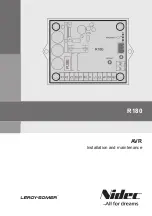
Signal Connection to External Devices
▲
■■■■■■■■■■■■■■■■■■■■■■■■■■■■■■■■■■■■■■■■■■■■■■■■■■■■■■■■■■■■■■■■■■■■■■■■■■■■
DS1104 Hardware Installation and Configuration March 2004
I
■■■■■■■■■■■■■
▼
154
■■■■■■■■■■■■■■■
▼
Definition of SNR
SNR (signal-to-noise-ratio) is defined as a true rms (root mean square)
ratio between the input signal and the noise. SNR is usually expressed
in dB.
The SNR for a sinusoidal input signal can be described as:
An application note from the well-known ADC manufacturer MAXIM
describes the formula used and explains how the SNR parameter
correlates with ADC performance:
Defining and Testing Dynamic
Parameters in High-Speed ADCs, Part 1.
It is available at
http://www.maxim-ic.com/appnotes.cfm/appnote_number/728.
Notes on
calculation of SNR
Often the peak-to-peak values of the signal and the noise are
mistakenly taken to calculate the SNR with the formula shown above.
However, this results in much lower performance than the A/D
converter really obtains. While the rms value of a sine wave can be
obtained by dividing its peak-to-peak value by 2.828, the peak-to-
peak value of a noise signal must be divided by approximately 6 … 8
to obtain its rms value (occasional extreme peaks must be ignored
using this equation). Furthermore, the peak-to peak noise theoretically
might be ±10 V (even if the inputs are shorted) without decreasing the
SNR, assuming that such high peaks appear rarely enough.
SNR
20
signal rms
(
)
noise rms
(
)
-------------------------------
dB
log
⋅
=
Summary of Contents for CLP1104
Page 6: ...Contents DS1104 Hardware Installation and Configuration March 2004 I 6 ...
Page 20: ...Safety Precautions DS1104 Hardware Installation and Configuration March 2004 I 20 ...
Page 118: ...Mapping of I O Signals DS1104 Hardware Installation and Configuration March 2004 I 118 ...
Page 162: ...Data Sheets DS1104 Hardware Installation and Configuration March 2004 I 162 ...
















































